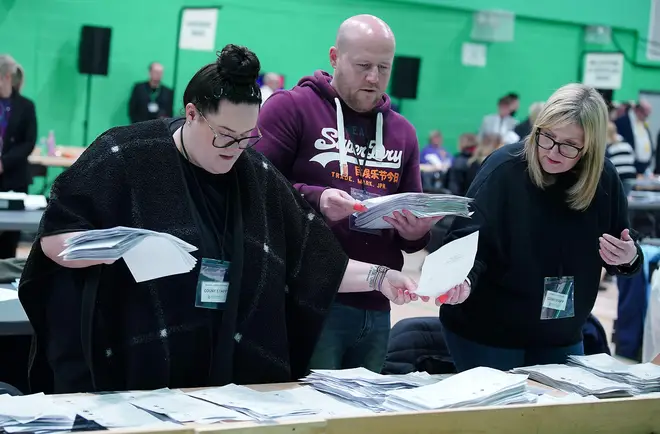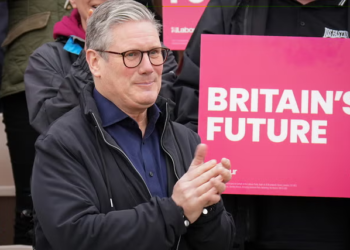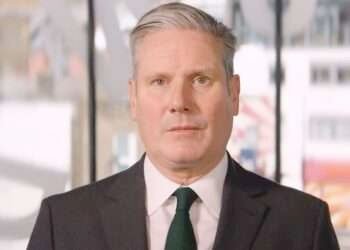Renowned political figure George Galloway is set to re-enter parliament following his victory in the Rochdale by-election, representing the Workers Party of Britain.
Galloway’s campaign resonated with voters, particularly in light of his opposition to Labour leader Sir Keir Starmer’s stance on the Gaza conflict.
Mr Galloway’s return to politics will be his fourth parliamentary seat after the candidate garnered 12,335 votes.
Addressing the crowd, Mr Galloway stated “Keir Starmer, this is for Gaza. You will pay a high price for enabling, encouraging, and covering for the catastrophe presently going on in occupied Palestine in the Gaza Strip.”
Who is George Galloway?
Former Labour MP George Galloway, known for his outspokenness and political maneuvers, represented Glasgow Hillhead from 1987 until its dissolution ahead of the 1997 election, after which he transitioned to representing its successor, Glasgow Kelvin.
Galloway’s tenure in the Labour Party came to a dramatic end in 2003 when he was expelled for actions deemed detrimental to the party’s reputation.
His critique of the then Prime Minister Tony Blair’s administration as “Tony Blair’s lie machine” and his call for British troops stationed in Iraq to disobey orders drew considerable controversy.
Despite his expulsion, Galloway retained his parliamentary seat in Glasgow until the subsequent election.
Subsequently, he aligned himself with the Respect Party, where he contested and won seats in the Bethnal Green & Bow and Bradford West constituencies, continuing his political career with a new affiliation.
Why is he a controversial figure?
He has long been a staunch supporter of the Palestinian people and critic of Israel, calling for the dismantling of the “Zionist state”.
In 2013, George Galloway faced allegations of racism following his controversial decision to walk out of a debate at Oxford University upon learning that his opponent held Israeli citizenship.
His blunt statement, “I don’t debate with Israelis,” sparked outrage and accusations of discrimination.
Throughout his career, Galloway courted controversy with statements and actions that would have ended the careers of many other politicians.
His meeting with Saddam Hussein drew intense criticism and vilification in the media.
In 2012, he faced backlash for seemingly suggesting that having intercourse with an unconscious woman constituted “bad sexual etiquette” rather than rape, prompting widespread condemnation.
Also, Galloway’s use of derogatory language further fueled public outcry. He found himself in hot water for using a derogatory word on the social media platform X, formerly known as Twitter.
In a heated exchange, he referred to a Twitter user as a “window licker,” a highly offensive slur targeting people with disabilities.
In the 2015 Bradford West election against Labour MP Naz Shah, George Galloway accused her of lying about her forced marriage as a teenager.
Currently, Galloway further stirred the pot by sharing a fake AI-generated audio clip. The clip falsely depicted Labour leader Sir Keir Starmer as indifferent to Labour’s loss in Rochdale, suggesting he prioritized scoring points with Israel.
Why did he stand in Rochdale?
Announcing his campaign, Mr Galloway stated that there is “no future” for Britain as a Tory Labour duopoly where both major parties “stand for entirely the same things… including on the supremely important issues of war and peace”.
He portrayed the Rochdale by-election as a chance for voters to express solidarity with “the people soaking wet, freezing cold hungry, living out in the open in Gaza.”
He insisted that “the people of Gaza would be voting for me in the Rochdale by-election” and urged voters to back him to send a message to Sir Keir and the “British political class”.

How did George Galloway win?
George Galloway won the Rochdale by-election for the Worker’s Party of Britain, overturning a Labour majority of 9,668.
He secured nearly 40% of the vote with a majority of almost 5,700.
This marked his fourth parliamentary seat since 1987, likened to Winston Churchill’s achievement. David Tully, an independent candidate, came second with 6,638 votes. Turnout was 39.7%.





















